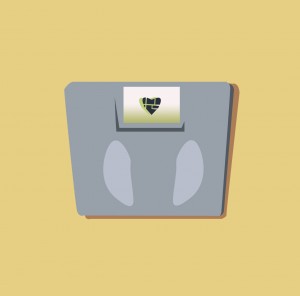Study reveals key to self-love

A recently released psychology study from the University of Waterloo indicated that women who display more self-compassion tend to have a more positive body image regardless of their body mass index.

A recently released psychology study from the University of Waterloo indicated that women who display more self-compassion tend to have a more positive body image regardless of their body mass index. Despite this, women who have a higher BMI generally tend to exhibit eating disturbances and a lower body image.
The study was conducted by Allison Kelly, an assistant psychology professor at UW, along with Kiruthiha Vimalakanthan and Kathryn Miler, both graduate students at UW.
The study surveyed 153 female undergraduate students who reported on their body image, eating pathology, self-compassion and self-esteem.
It found that women with self-compassion tended to approach life with an increased level of patience and understanding in reference to themselves, resulting in a more positive body image. They tended to have more normal eating habits and be less concerned about their weight.
“They have better body image and also they just tend to tolerate it when there are parts of their body that they don’t like,” said Kelly.
“Self-compassion seems to protect, especially more overweight women, from having bad body image and engaging in more disorder eating.”
Women who demonstrated lower self-compassion have a difficult time being nice and reassuring to themselves when they fail, and consequently also tend to have lower self-esteem. This is with regard to their bodies, along with other areas of life.
According to Kelly, self-compassion differs from self-esteem, as people who possess high self-esteem generally think they are very successful and above the average.
“The reality is that for most of us there are going to be periods in our life when we fail, other people do better than us and so forth, and so that actually makes it pretty hard to maintain self-esteem unless you are somehow always outperforming others,” Kelly explained.
Self-compassion conversely offers a different type of positive self-image that allows one to act more nurturing to oneself even in the face of failure. It is more about self-acceptance and unconditional self-love.
When some individuals who have really high self-esteem fail, it tends to diminish their confidence and does not always allow them to recognize how they may have contributed to their failure. People with a high degree of self-compassion, however, are able to recognize and learn from their mistakes.
“More and more research is showing that if we want to help people be resilient and roll with the punches that life presents, just generally, and also with regards to body image … then self-compassion might be a more important thing to cultivate than just trying to boost your self-esteem,” said Kelly.
According to Kelly, other research is also showing a correlation between mental health and self-compassion. People who are self-compassionate tend to have lower levels of depression, anxiety and eating disorders. They are also able to cope better when faced with obstacles, such as a break-up, medical illnesses and poor grades, among others.
“The less critical one is on themself, the more likely they are to think positively of themselves,” said Aviva Abramovitch, a fourth-year psychology student at Wilfrid Laurier University. “The more positive outlook would then cause them to have positive body image and all around more positivity in life.”
Research also indicates that self-criticism is extremely detrimental to a person’s well-being. There are a lot of different ways that can help people to increase their level of self-compassion.
Additionally, there are different forms of psychotherapy that one can undergo in order to gain help dealing with a particular issue, or to simply become more self-compassionate. Self-help strategies are also tactics that can be utilized to cultivate individual self-compassion.

